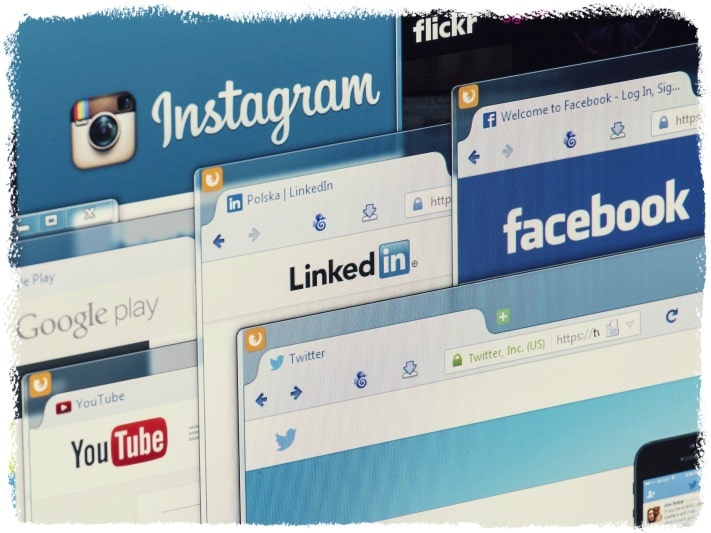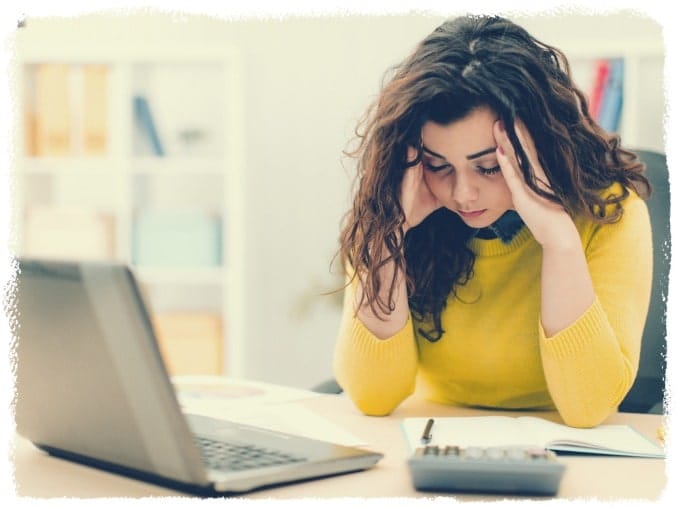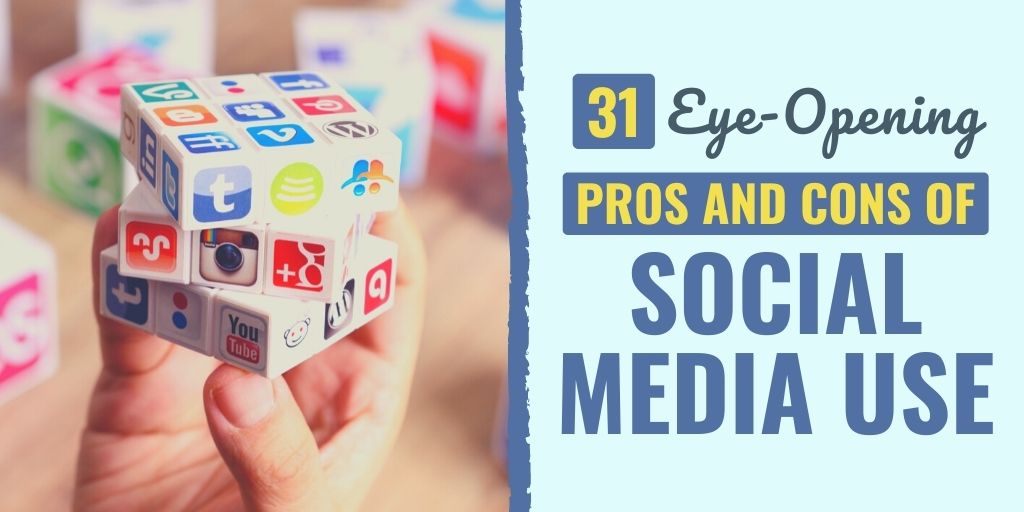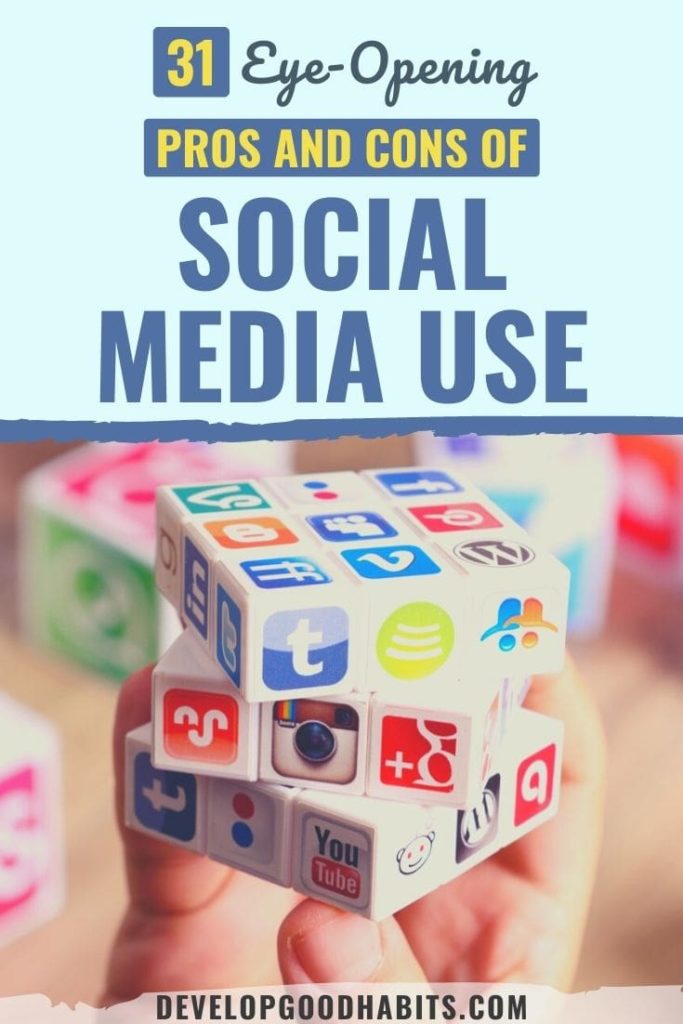Many of us have conflicting feelings about social media.
In just a few years, it has already changed the landscape of communication, business, and education.
While one group extols the virtue of faster communication with the advent of social networking sites, others vilify it for the reported negative effects it has on our mental health.
Indeed, the use of social media is on the rise, as a recent survey from Pew has revealed. It is everywhere, encroaching in all aspects of our lives. We can access it with just a tap on our smartphones, tablets, and computers.
With this accessibility, however, it is understandable that we feel worried.
How exactly does it affect our lives?
Some might say that social media destroys lives. Others feel it has become a critical part of our modern society.
So in this article, we'll discuss 31 pros and cons about social media. Once you read this article, you'll be able to determine if you should continue spending time on the various social platforms.
Now, if you feel like your social media habit has gotten out-of-control, then you can use a tool like the Freedom app, which can block specific apps and websites.
Pros of Social Media Use
1. Allows you to keep in touch with people
From time to time, we wonder about friends we’ve met along the way and what they’re doing now. Social media is a great way to maintain those connections. Name-search features allow us to reconnect with long-lost friends and network with people we want to get to know better.
2. Socialization even for the most introverted among us
Through social networking, you have a way to make new friends even if you are the most introverted person on the planet. The gift of relative anonymity on social networking sites allows you to connect with others at deeper levels without being afraid of exposing your true identity.
3. Speeds up communication
Through social networking websites, you can communicate faster and more easily. You can reach out to those who are asking for help and can share your thoughts and opinions in discussions in a matter of seconds.
4. Eases loneliness
Many of those diagnosed with depression have been in the grips of extreme loneliness. The groups of people who are most susceptible to loneliness include geographically isolated individuals, the infirm, and the elderly.
Social media can help them to keep in touch with families and friends, as well as meet new people with whom they share common interests.
Now, if loneliness is part of your life, then check out these 15 ways to be happy alone.
5. Promotes safety and saves lives in times of crises
We’ve seen users on social networks post statuses, images, and videos in areas devastated by hurricanes, forest fires, earthquakes, tsunamis, and civil unrests.
use allows for the diffusion of information during times of crisis. Real-time posting in actual locations in crisis can provide emergency responders with necessary information about the ongoing situation in order to take appropriate action.
6. Promotes compassion and empathy
Social media is often viewed as a negative influence in people’s lives. However, some social networking site users have attested to becoming more compassionate and developing empathy when they viewed posts that promote compassion and/or understanding (e.g., posts asking for support for victims of natural disasters).
7. Promotes social change
Younger people are realizing the power of social media for promoting change. The youth have launched numerous campaigns that call their peers to pressure governments and business to become fair, such as exposing corruption, improving educational facilities in their locations, and fighting against gender stereotypes.
8. Support for personal growth
Social interactive groups are designed to help you connect with individuals who share your interests. One of the best ways to develop your character is to find a like-minded community that can boost your personal growth. Social media can help you do that.
And if you're interested in personal growth, then check out these 36 personal development goals you can set and achieve in your life.
9. Timely support during personal crisis
Some people have turned to social media friends for support during difficult times. There is a sense of relief that they are able to share their thoughts while undergoing a personal crisis and see that there are people who respond to their concerns.
For some people, the support they get through their friends on social networks has prevented them from taking drastic actions at the lowest point of their lives.
10. Support for your talent and craft
A social site is a place where you can showcase your talents and attract the right audience who can support your craft. Groups allow you to get the feedback you need in order to improve as well as the much-needed support.
11. Sets you on your path as a life-long learner
Social media makes it possible to connect with professors, academics, and experts in ways that encourage you to become passionate about learning. It enables you to focus on things that help improve your knowledge base.
12. Enables you to become an inspiration
Posting about your experiences on the journey to self-discovery can be a source of inspiration to others who are in a similar situation. Your posts can serve as a springboard for others to find hope and the skills to deal with what they are going through.
13. Influences you to live a healthier life
What happens when you see someone posting their own pictures while pursuing their health goals? Most likely, you’ll be inspired to make healthy changes to your own life as well.
14. Strengthens your existing relationships
For various reasons, many people live far away from their families and loved ones. With social media, the distance can be bridged with regular chats and calls, and messages. Communication is never broken and can even make the bond of family stronger.
15. Spreads positivity
The emotions, whether positive or negative, that we share on social media are contagious. Posts that promote positivity have a powerful effect on people’s moods no matter where they are geographically located. Make it a conscious choice to spread positivity all the time.
16. Allows you to have fun
Social media, when used in moderation, can provide fun and enjoyment to its users. Social-media apps allow you to keep in touch with friends, uplift your mood, and keep you up to date with what’s happening in your social network.

Cons of Social Media Use
17. Can cause addiction
Social media addiction is on the rise. Currently, more people are spending the majority of their waking hours compulsively using social media, neglecting face-to-face interactions and other responsibilities. Internet addiction has negative effects on people’s health and well-being.
18. Triggers insecurities
When you browse through any social media platforms, you’ll find pictures of people who seem to be having the best time of their lives. You’ll find posts about their travels, high grades and other achievements, and recent purchases. You feel that your own life pales in comparison to theirs.
Social media use has been identified to cause distress and trigger insecurities. The most vulnerable are the young people, who feel pressured to “make things happen” in their lives and keep up with their peers.
19. Enhances your fear of missing out
The same way that point #18 triggers your insecurities, the fear of missing out (FOMO) can increase when you browse through social media and see what others have accomplished and you begin comparing it with your own.
Keep in mind that each one of us has something unique to offer to the world. Being afraid that you’re not achieving enough has a negative impact on your well-being.
20. Increases the risk of depression
Excessive use of social media has been identified to raise depression in susceptible individuals. The longer they are logged in to their social networks, the higher the chances that they become isolated and depressed.
21. Falling behind tasks
Those who are constantly online for the majority of their waking hours usually put tasks and duties on hold. Procrastination negatively impacts people’s sense of responsibility, especially if they have become addicted to social media use.
And if you feel like you might be procrastinating too much, then watch this video to learn a simple strategy to figure out if you're wasting too much time.
22. Overloads you with information
People are bombarded with news feeds whenever they log in to Facebook, Twitter, Reddit, Instagram or other social media platforms. Most of this information, however, is irrelevant to our daily lives.
Because of information overload, we no longer have the chance to absorb and process information that is relevant to us. The result is that we are not as well-informed as we should be about current events.
23. Your privacy becomes at risk
We are often advised to be cautious about sharing details of our lives on social media. Oversharing can put our privacy at risk.
Sometimes, however, no matter how cautious you are about your personal privacy settings in your own account, you cannot control what your friends share online. More often, you will be tagged in photos and posts about their personal lives, whether it is with or without your consent.

24. Can be psychologically damaging
Teenagers comprise the largest percentage of social media users. Because of this, they are the most vulnerable to its adverse effects on mental health. It is not only because it triggers insecurities or depression, but teens can fall victim to online bullying from their peers.
25. Negatively affects academic performance
Studies have shown that spending too much time online, most especially on social media, cause students to neglect putting in hours meant for school work. This negative impact in school performance is usually evident in lower grades.
26. Prevents you from having real human contact and interaction
Many social site users are so engrossed with making sure that they’re up to date with what’s going on in the lives of their online friends. However, they often fail to cultivate meaningful interactions in real life. They may have thousands of friends in a social app but suffer from absolute loneliness offline.
27. Makes you doubt your own judgment.
Using social networking sites raises your exposure to too much misinformation. There’s fake news, emotionally reactive posts, and just plain hoax circulating as real information.
Sometimes it’s hard to tell which information is true and which one is fabricated. It can lead to doubting even the opinions you formed after reading all available information on social media.
28. It makes you less productive
Prolonged internet use kills productivity. A recent study reveals that the average person is online in a social media platform for approximately 2.4 hours a day.
If you are addicted to using social networks, the number of hours would be higher, putting your job at risk if you also use these apps while you’re at work.
29. You are exposed to violence
Recently, social media has become a platform for criminals to broadcast their crimes. Although criminals have been arrested by the police after they posted videos of their crimes on social networking sites, many people have unwittingly seen the videos of the actual crimes. This occurred when some users decided to share these on their own social accounts and appeared on your news feed.
30. Weight gain and other health complications
People who spend so much time online often have sedentary lifestyles. This increases their risk for heart disease, diabetes, and other health complications that can shorten your lifespan.
Furthermore, most people who are addicted to social media have unhealthy sleeping habits. Again, this makes them vulnerable to a lot of health complications.
31. Missing out on opportunities to be with family
When most of our waking hours are spent online, we lose the chance to be with our families for much-needed bonding time. If we are parents to young kids, we miss crucial milestones by being so immersed in social media.
Are these cons staring to overwhelm you? Here's how you can detox from social media and be a happy, healthier you.
Final Thoughts on the Pros and Cons of Social Media Use
These eye-opening pros and cons of social media use remind us to be constantly mindful of how we utilize social media. Moderation is the key.
If you suspect that you are becoming addicted to social media, there are ways you can stop this habit. Visit this post to view 27 steps that are guaranteed to break a bad habit.
Furthermore, lessening the time you spend online can help curb your tendency for excessive social media use. This post can guide you on how to stop wasting so much time on the internet.
If you're a social media manager, here are some SMART goals examples for social media marketing.
Finally, if you feel like your social media habit has gotten out-of-control, then you can use a tool like the Freedom app, which can block specific apps and websites.


